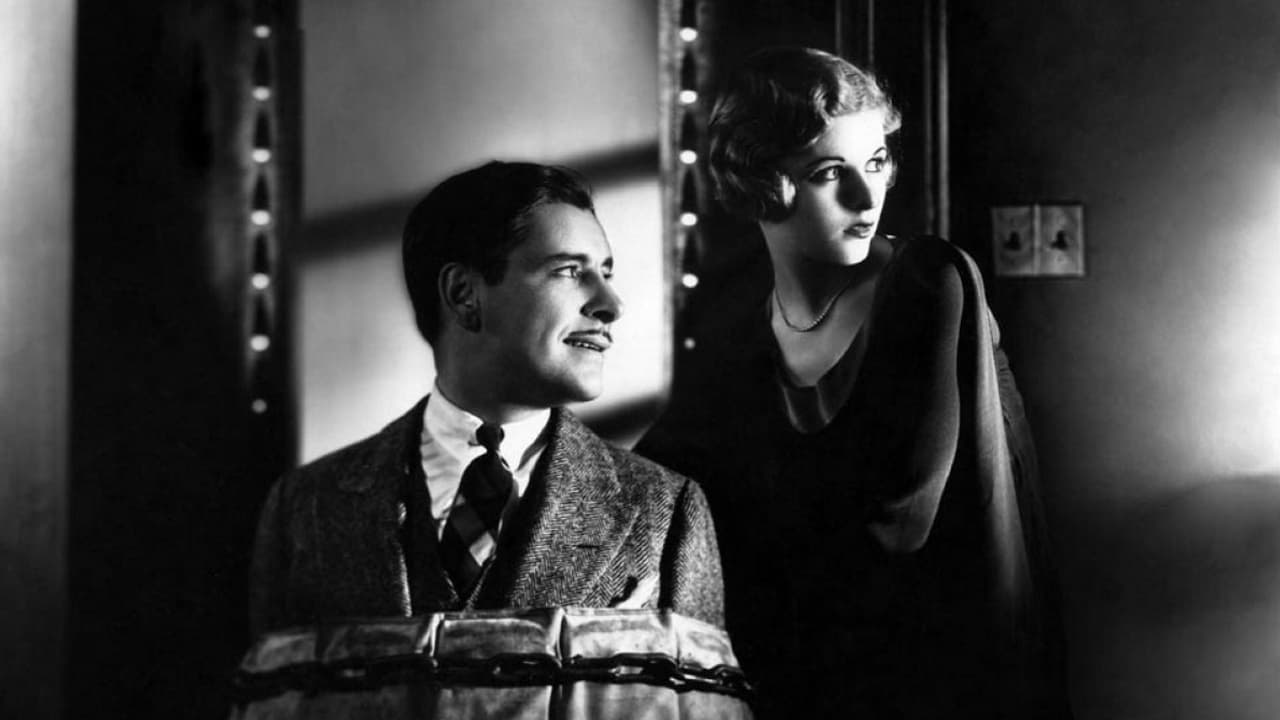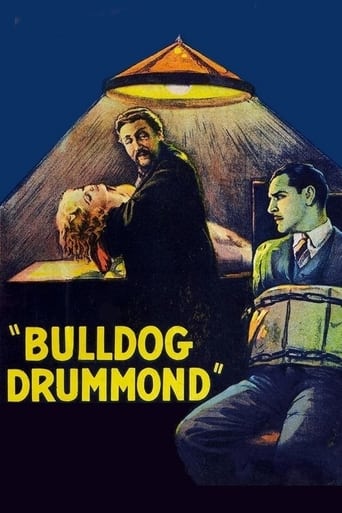

I wonder how many film fans, for no one else would choose to watch a very early talkie, for they are a very bumpy watch with such stilted over the top acting, and rounded exaggerated word delivery, while the crude sound equipment of the era made moving and talking impossible, so the actors stand still and well talk, its all very much like filming a dull play, and so often, so very very dull. Off coarse, modern audience completely fail to get the thrill of seeing the silver screen talk. The poster makes the point Ronald Coleman "All Talking" Bulldog Drummond. Well i do believe this is the best early talkie i have ever seen by long way, the script from a stage play i assume, is witty and lively, and by switching from "Talkie" to "Silent" where we are treated to silent movie tricks such as shadows, the film makers deliver a very lively picture full of twists turns and some very gay old fashioned thrill's and spills. Ronald Coleman was Oscar nominated for this role and i can see why, for while all around him give perfectly fine period performances typical of the era, Coleman on the other hand is Bulldog Drummond and simply cruises through the movie by being totally natural, he is so good in fact, he could walk out of a 1929 film by instant time warp and be perfectly plausibly playing a role in a 2017 film, no bother at all. But, who and what is Bulldog Drummond, well i'm trying to work on this my self, he tells us he is to rich to work and he is bored. So ex army captain Drummond a very fine posh very rich beautifully spoken top rank English gentlemen, saves damsel's in distress, to relieve the boredom of it all. Well what else could he do? Most i think would, simply play cricket. To sum up, i loved it. A time warp 9 from 10. well no one's perfect, not even the British Bulldog!
... View MoreThe first entry in a long-running film series comes from 1929, but in some ways it looks more modern than that. Despite its being a very early talkie, the dialogue flows naturally, and the camera work is rather advanced as well. Ronald Colman plays a suave adventurer in a style not far removed from that of Sean Connery as James Bond, several decades later! And Lilyan Tashman, as a wicked bad girl, gives a supremely self-assured performance; although not as "conventionally" beautiful as her co-star, Joan Bennett (who plays the slightly whiny damsel-in-distress), she is far sexier. The story, however, is nothing special; essentially a continuous back-and-forth between two locations (an inn and a phony "clinic"). And there is no real ending - the way the film ends, you'd think the story would be continued in the next chapter, but apparently that never happened! **1/2 out of 4.
... View MoreWhen the first "Bulldog Drummond" stories came out in the 1920s, Great Britain was trying to come to grips with an anomaly: it had been one of the main allied victors in the Great War but the country did not feel like it won anything. It felt it had sacrificed too much.Britain in 1914 had ruled the waves. It had a small (but apparently competent) standing army. It had a history of democracy that was stable and unmatched by any of the major continental powers of Europe. It had a very highly industrial economy and was commercially quite important on the globe. Finally, it's empire stretched around the world that the boast that "the sun never set on the British Empire" was true - it was also the world's largest empire.In truth Britain's empire was actually wearing away. Though the British technically won the Boer War Boer Leaders ended up running South Africa. Ireland was getting hotter. The Germans helped stimulate the Easter Rebellion with arms. The British Navy did control the seas but the u-boats almost beat Britain during the war. The naval battles were marred by a total German triumph under Von Spee in the Pacific (Coronel)and the lopsided British ship and men losses at their "victory" at Jutland. Finally, Germany and the U.S. had outstripped British commerce and industrial output by 1914. With the huge losses of a generation of men, and no tangible gains, Britain was in for a serious period of reactionary feelings and even race baiting. Anti-Semitism (always under the surface) reemerged in the 1920s, mostly due to the rise of Bolshevism in Russia after the 1917 revolutions. The political landscape did not reduce this hysteria. Lloyd George was booted out of the Prime Minister's seat forever in 1922. His successor, Andrew Bonar Law, died after nine months in office. Stanley Baldwin was not fully ready to be Prime Minister in 1923, and would blow his administration by a public hissy fit. His rival, James Ramsay MacDonald, would be the first Labor Prime Minister. But he'd been an outspoken pacifist in the war, and he was suspect of Bolshevistic sympathies (he actually had none). In the 1924 General Election a forged letter (supposedly from Gregory Zinovieff, the head of the Russian Comintern) urged MacDonald's election as an agent of the Russians. Baldwin regained office with a large majority.It is this background that explains the popularity of "Bulldog Drummond". With governmental drift and doldrums, a declining economy, a feeling of loss of face on the international scene, and a feeling of loss due to immense death toll, the search for easy answers, easy suspects, easy enemies was ready for Sapper's poison. So the public cheered Col. Hugh "Bulldog" Drummond as he created a fascistic group of ex soldiers (like the German Freikorps) to "control" the internal enemy (i.e., Bolsheviks, Jews, Irish). I might add this was not totally made up. Lloyd George gave the go ahead while Prime Minister to create a paramilitary group in Ireland, the "Black and Tans", to combat the Irish revolutionaries. This group was finally decimated by Michael Collins' men on "Bloody Sunday" in 1921.That Samuel Goldwyn, a Jewish American film producer, produced BULLDOG DRUMMOND, is highly ironic. But it illustrates the care Goldwyn brought to his projects. He had been producing the silent film hits that Ronald Colman appeared in in the late 1920s. Goldwyn wanted Colman to make the transition to sound carefully, and not fall on his face like Colman's rival John Gilbert. Instead of "Darling, I love you!" in HIS GLORIOUS NIGHT, Goldwyn found an exciting adventure part for Colman, which allowed him to display his wonderful, gentleman's speaking voice. As an introduction for a talking Colman, BULLDOG DRUMMOND could not be beaten. The role had everything to show Colman's versatility. There was his humor, shown at the beginning when he is dismayed at the ridiculously boring men's club he belongs to (full of old fogies). There was his romantic side, with the youthful Joan Bennett. There is his confrontations with the sinister Lawrence Grant (Dr. Lakington) and Grant's two assistants Montague Love and Lilyan Tashman (Carl Peterson and Irma), and his handling of his impossibly stupid friend Algy (Claude Allister). As a "coming out" role for talkies, BULLDOG DRUMMOND did the trick, winning Colman the audience he feared talking films would cost him.In terms of plot it creaks, with incredible coincidences and twists that allow plot points to fall apart for the creation of new plot points. Still the cast is game, and the script surprises us. Lakington, briefly having Drummond tied up, is speaking to him pretty closely. Colman turns his face from Grant, who accuses him of being more cowardly than he'd admit. Colman rejects this excuse. Then why turn your face away, demands Grant. "Haven't your best friends told you?", says Colman, leaving Grant turning crimson at the thought of halitosis. A later bit of business, allowing Love and Tashman to escape is also unexpected. Yes, it is an antique, but it is a charming one. And as it has none of Sapper's racist crap in it, it is highly recommended.
... View MoreMelodramatic, overacted, and occasionally senseless, but who cares? Colman is almost devestatingly charming in his first talkie, Bennett is lovely (but a bit whiny at first), and Algy is a first class twit. The villains are vile, the action is fast once you adjust, and Colman is a sheer delight to watch. Why there hasn't been a major Colman revival is beyond comprehension.
... View More